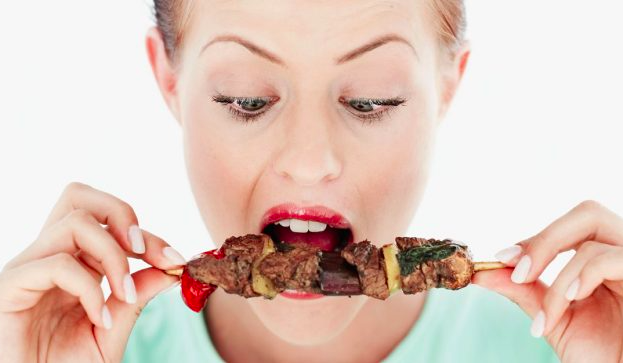
OK ladies, so unfortunately it sucks that we have to deal with menopause, but that’s life and we just gotta suck it up! Men get it easy hey, I mean, do they really know they are born half the time!…No!
Menopause is another obstacle that many of us use to excuse weight gain, and to be fair I don’t blame you as weight gain is much easier when we hit middle age, but that is only because we allow it to be.
Throughout menopause, we experience hot flushes, night sweats, and mood swings (In my case, I don’t need menopause to experience this *sigh*) but just because our mood changes doesn’t mean our weight has to change too.
Before, during, and after menopause, your oestrogen levels begin to deplete and your metabolism slows, making it more difficult for you to lose weight, particularly around your middle. It also sucks that after menopause weight gain mainly sticks to our bellies. There is only one way to fight this, and that is to change our mindset; work hard and make changes to our lifestyle. Remember reaching your goals and sustaining weight loss is about making a lifestyle change, not trying shitty quick fad diets.
Here are several ways to help with menopausal weight.
1. Exercise More Often and more Intensely.
Start with a mix of moderate and vigorous exercise to burn off menopausal weight gain. Throughout the week you should be including lots of low-intensity exercise such as walking, jogging, swimming (whatever floats your boat) as well as high-intensity resistance or strength training sessions. Walking several hours a week just ain’t gonna cut it as we get older, unfortunately.
The Centers for Disease Control and Prevention (CDC) recommends that all adults need at least 150 minutes of moderate-intensity aerobic activity every week, and two or more days a week of muscle-strengthening activities that work all of the major muscle groups, like the legs, hips, back, abdomen, chest, shoulders, and arms.
You’re not necessarily going to be at the same level as you were in your twenties, but you need to redefine normal. As you get older you need to re-adjust your norm as your metabolism ain’t gonna be the same so quit with the ‘I used to be able to lose weight but now I can’t’.” Yes, you can, It just isn’t going to be quite the same. You have to increase your daily activity to keep your muscles strong and your metabolism active.
2. It is time to build muscle
After age 30, each decade we are prone to lose up to 5% muscle mass, and when we hit the menopausal phase, it is associated with a natural decline in oestrogen, that increases visceral fat (fat around the essential organs) mass, decreases bone density, muscle mass, and strength. With this in mind, it is so important to strength train several days a week. Not only does strength training help slow down depleting bone density, but it also means that it can help increase our metabolic rate as the more muscle we have in our body, the more we metabolize food quicker as muscles help aid digestion of food three times as fast as fat.
3. Stand rather than sit
Basically the more you stand the more calories your body will burn. A study published in January 2018 in the journal Obesity found that prolonged sitting is connected to higher levels of abdominal fat, as well as fat that’s accumulated around organs such as the liver, which increases the risk for diabetes and heart disease.
It’s not rocket science and you can adjust little things in your daily life – stand and pace when you’re on the phone, or park further from the places you’re going so you’ll have to walk more. If you binge watch TV, then at least get up every so often and pace around a little. Basically, every step counts so the more you move the more you will burn.
4. Keep an eye on your portion size
Your metabolism slows down by the time you hit menopause — with some research suggesting it burns a couple of hundred calories fewer a day. You can easily avoid 200 calories, but it is also very easy to subconsciously eat 200 more. Portion size is often a huge contributing factor to weight gain so just try reducing your portions for each meal and you will soon start to see results.
Portion size is another thing we don’t tend to watch when we go out for meals or get a takeaway. Usually, these meals are served twice as large as our recommended portion size, and they are often loaded with sugar! Why else do you think they taste sooooo good and leave you wanting them again!
5. Timing
There are so many different studies about what time we should eat our meals, but ultimately it boils down to ensuring you have fewer calories than you burn. Although it really doesn’t matter how late at night you eat, the one thing we have to be mindful of is that at night you will most likely not burn off your evening meal as easily. With this in mind, try having your largest meal at lunchtime, and starting your day with a hearty breakfast that includes protein.
6. Fat is fat so choose wisely!
Ladies – you gotta be careful with fats! Yes there are good fats and there are bad fats but if you want to lose weight it doesn’t matter what fat you eat, they have still got the same amount of calories in. How many times do I hear – I eat healthily but still can’t lose weight! There is a difference between eating healthy and eating to lose weight.
The healthiest fats are the ones that derive from vegetable sources like olives and nuts, but keep in mind that healthy fats — like those found in avocados — have the same number of calories as the fat found in ice cream or chocolate.
7. Reduce stress levels
If your body is making you feel stressed — or vice versa — don’t disregard that link. “There is a stress-fat connection”. If you walk around completely stressed all the time, your cortisol levels will increase, and that will make it easy for you to deposit fat deep inside the belly.
Cortisol, known as the stress hormone, stimulates the liver to increase the production of blood sugar and helps the body convert fats, proteins, and carbohydrates into usable energy. As part of the body’s fight-or-flight response, cortisol is released during stressful times to give your body a natural energy boost, but when cortisol levels are constantly high because of chronic stress, these same effects may result in insulin resistance and type 2 diabetes.
To reduce stress, give these a try!
• Take a walk. Research shows that being in nature reduces stress. Go for a walk, listen to music, and switch off from the daily stresses of life! Even if for just half an hour!
• Try a new app. Meditation apps, such as Insight Timer, Headspace, and Calm, offer five-minute and other timed meditations for beginners that can lower heart rate and reduce stress. Meditation isn’t for everyone, but give it a go and see how you feel
• Reduce your alcohol intake. We all love a glass of wine or a G&T, and why the hell not! Alcohol is a depressant and also messes with your sleep, aside from that alcohol is very calorific! A large glass of wine can have up to 200 calories in, nearly the same as a Mars bar! So the ‘ I only had a few glasses of wine last night’ is the same as shoving a few Mars bars in your mouth and wondering why you’re not losing weight!
• Take time out for yourself – This is a must! You gotta take some timeout for yourself to relax, even if just for a short while. Everyone deserves to relax a little.
I hope this helps!
Clo x
WE ALL HAVE THE RIGHT TO FEEL LIKE WONDERWOMAN WHATEVER AGE WE ARE







